Vale Piyush Pandey: The giant who gave Indian advertising its soul (and moustache)
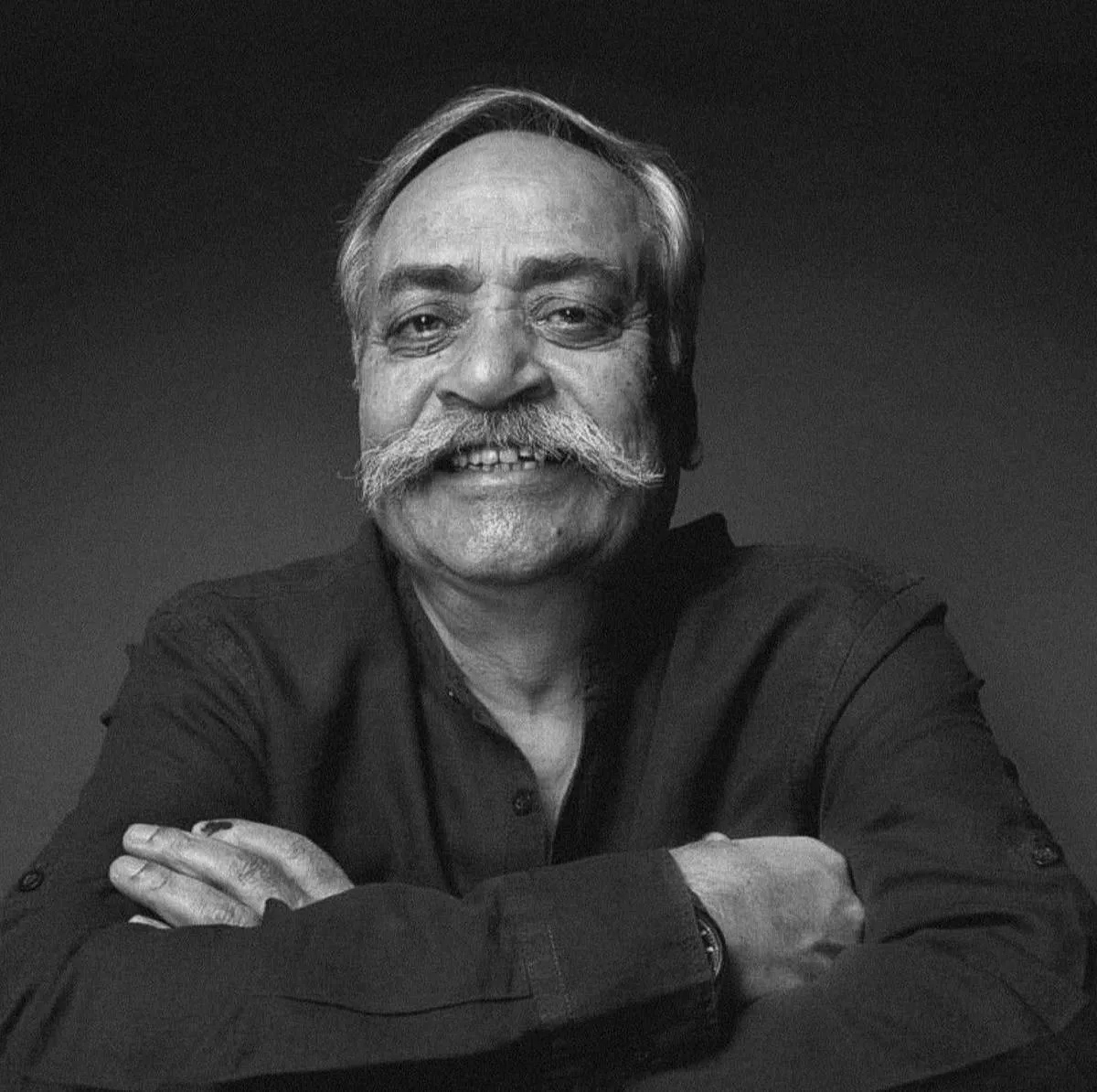
Indian advertising legend Piyush Pandey passed away on Friday from complications following a stay in hospital. He leaves behind a legacy so profound that India’s business leaders, cultural icons, their ad industry and Asia’s creative community have collectively paused to honour him. The outpouring of grief has been immense and heartfelt, but not unexpected. For decades, Piyush wasn’t just an advertising leader – he was the heartbeat of Indian creativity. A lot has been written about Piyush over the past few days but here, Campaign Brief Asia’s Kim Shaw gives a personal tribute to a legend who was loved by everyone he met.
From Bollywood superstars and musicians to CEOs and his advertising peers and friends, tributes have flooded in for the man who transformed everyday Indian life into powerful stories that moved the country.
As many people will tell you, Piyush’s genius lay in his humanity and his creative insights. He saw magic in ordinary things. His sharp observations and deep empathy made him a storyteller of the people. In one article Piyush was described as “someone who could talk to every person in a way that is human and move them to act. That is what makes him a simple yet powerful storyteller.”
Hephzibah Pathak, Executive Chairperson, Ogilvy India, summed up what many in the industry feel with the news of his passing: “He didn’t just change the game for our industry; he changed our lives. His fearless heart and unwavering goodness inspired us to see the world, and ourselves, differently. His philosophy, ‘Kuch khaas hai hum sabhi mein,’ wasn’t just a line – it was his way of life.”
Harshad Rajadhyaksha, Kainaz Karmakar and Sukesh Nayak, Chief Creative Officers of Ogilvy India, added: “The most honest thing we can say is that we’re numb. SO many memories are flooding our hearts. His living room was our second office. From the day we joined Ogilvy, to this day, he was our Creative Director and we were his team. This is an honour we can’t forget or replace. Even if he can’t hear us present ideas anymore, every time we create something, we will be asking ourselves, ‘Will Piyush like this?’ What we can promise as our tribute to him is to carry on his belief in creativity, culture and bravery.”
Reed Collins, CCO Ogilvy APAC, reflected: “Our hearts are stilled, for a legend has departed. Piyush Pandey didn’t just shape culture; he shaped us. We mourn his absence, yet rise with fierce gratitude, committed to carrying his bat, forever building on the extraordinary innings he so brilliantly played.”
Born in Jaipur in 1955, Piyush lived many lives before advertising — cricketer, tea taster, construction worker — experiences that shaped his connection to real Indian life. He joined Ogilvy in 1982, and by 2004 became Executive Chairman of Ogilvy India. He went on to serve as Global Chief Creative Officer of the Ogilvy network — a first for someone from Asia.
His achievements are legendary:
First Asian to chair the Cannes Lions jury in 2004.
Campaign Brief APAC Hall of Fame inductee the same year (see spread at bottom).
Recipient of well over 600 national and international awards.
He received the Lifetime Achievement Award from the Clio awards in 2012. View this funny tribute shot by his brother Prasoon and shown on the night at the Clio Awards
He was honoured with the Indian National Civilian Award (Padma Shri) in 2016 by the President of India.
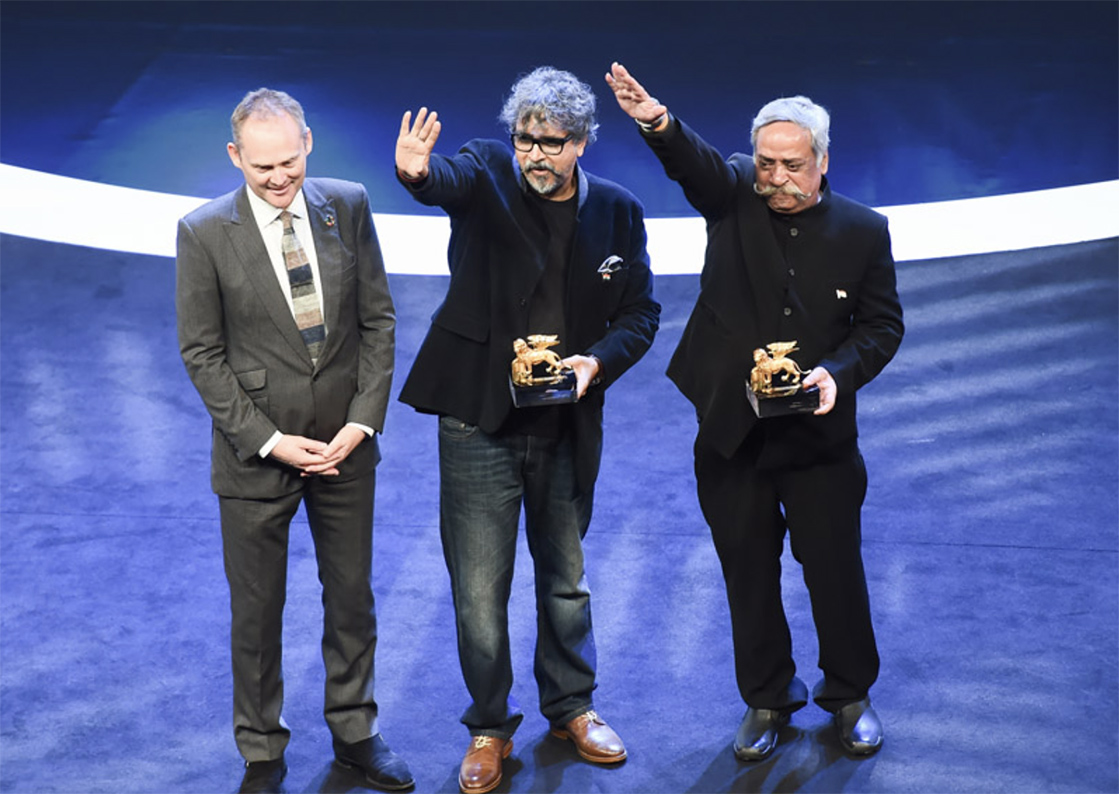
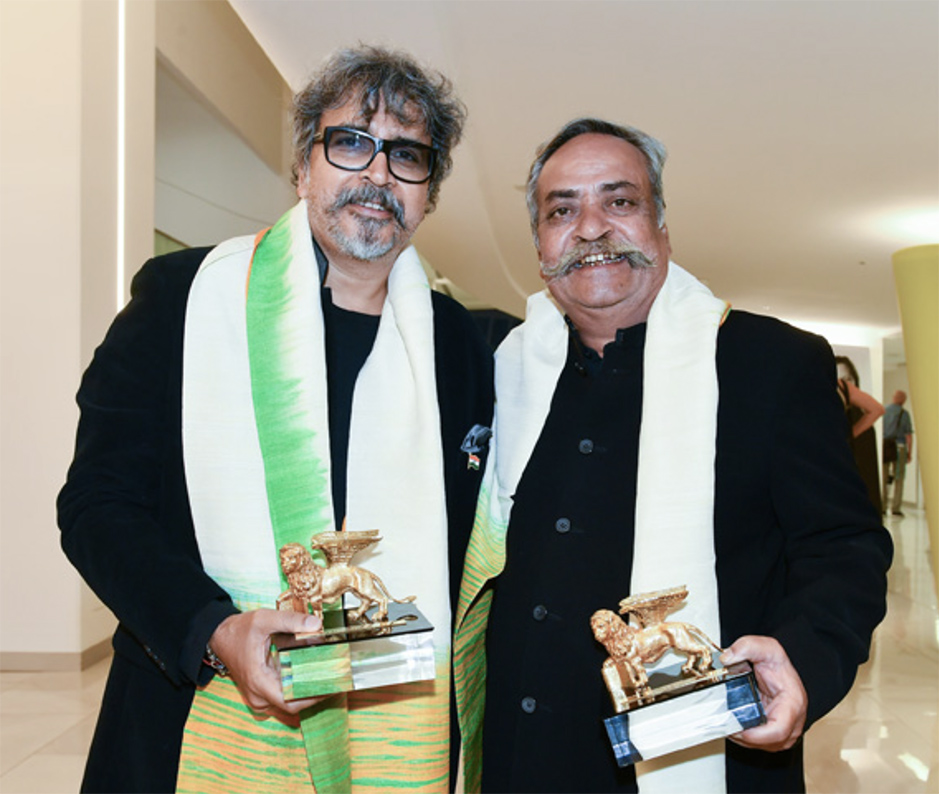
Then in 2018 he was the recipient of the Lion of St. Mark award (with his brother Prasoon) at Cannes Lions (pictured above).
To cap this off Piyush was named The Economic Times’ Most Influential Person in Indian Advertising for 14 straight years.
But Piyush was never driven by awards. He was driven by impact. His campaigns weren’t just about selling products – they were out to change behaviour.
His long association with UNICEF and the Government of India played a major role in India being declared polio-free in 2014.
Piyush was also a teacher, a leader and a strong believer in the power of India’s culture. It’s been stated many times, but for Piyush advertising was not about persuasion through intimidation. It was about speaking to people with respect, authenticity and delight.
In his books Pandeymonium and Open House, he championed creativity as a force for good and encouraged the next generation to learn not by instruction, but by inspiration.
In 2024, Pandey stepped back and moved into an advisory role at Ogilvy, but his influence only deepened. A favourite story that Ogilvy team members have retold to Campaign Brief Asia over the years is that when clients hesitated on bold work, the most reassuring words account teams could offer were, “Yes, Piyush has seen it and likes it.” That was enough to get great ideas through.
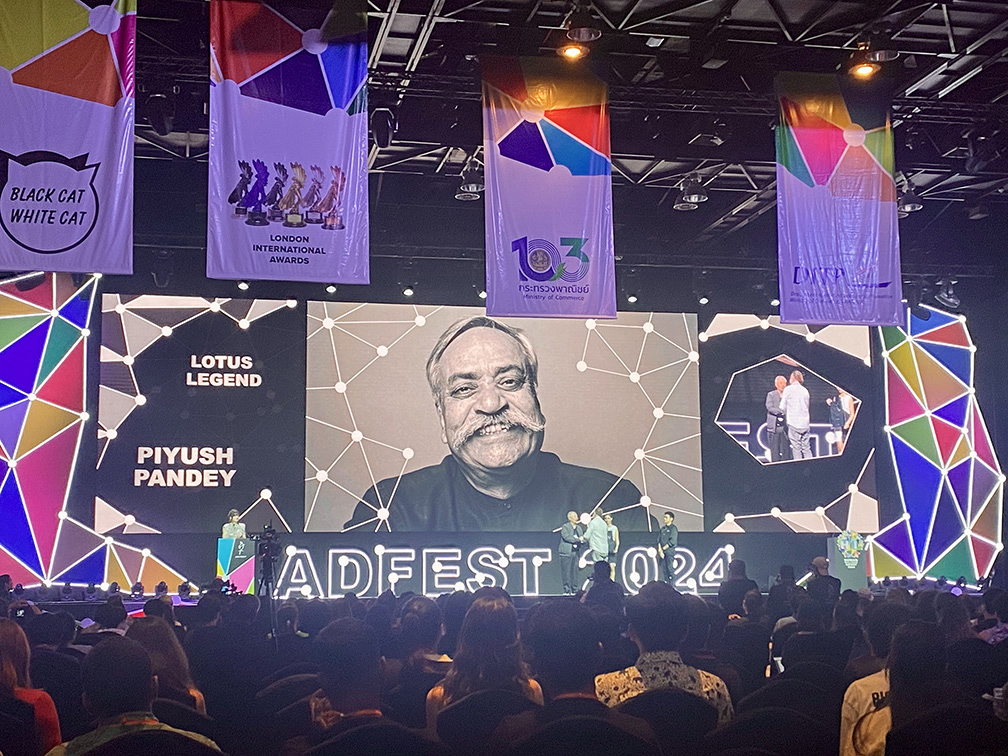
From a personal perspective: Piyush was an amazing believer, supporter and friend to Campaign Brief Asia – just as he was to generations of colleagues, creatives, clients, and fellow trade media across the region, including dear friends like Angel Guerrero at Adobo and Harmander Singh at Adoi/Marketing. His heart, his accessibility, his generosity, and his support for both mainstream and trade media in India and across Asia were unparalleled and I have no doubt that the love, time and encouragement he invested in his home market alone would have eclipsed anything we experienced, yet he always made us feel like we mattered.
In the past 18 months, Campaign Brief Asia proudly witnessed three major international honours bestowed on Piyush:
The Lotus Legend award at ADFEST in March 2024 in Pattaya. The London International Award’s Legend Award in October 2024 in Las Vegas. And, in his own backyard, the Master of Creativity Award at the Kyoorius Awards in Mumbai in May 2025.
At ADFEST, (pictured above) Pandey shared a message that now feels like a creative anthem to all creatives in Asia: “You don’t wear your country on your sleeve, you wear your country in your heart. Believe in yourself, believe in your country and believe that the world will salute you one day.”
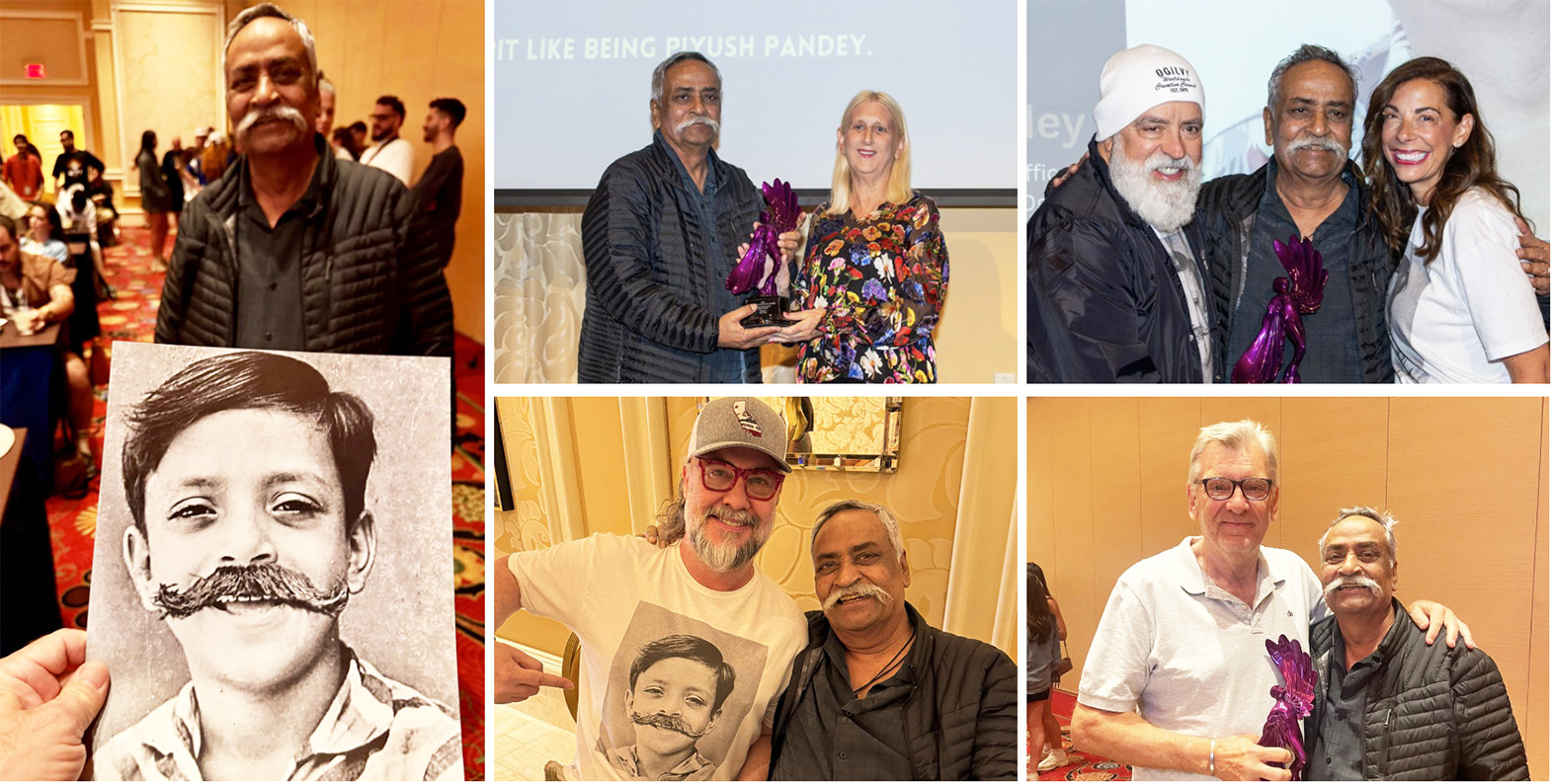
The LIA presentation in Las Vegas (above) was attended by Piyush’s wife Nita and his senior global Ogilvy network family including APAC CCO Reed Collins.
The intimate celebration Reed organised for Piyush after the presentation spoke volumes for the respect Reed hald for Piyush. It was an unforgettable honour to join Piyush, Nita and Reed for dinner and then to witness the surprise flashy limousine tour of the Las Vegas strip organised by Reed. Piyush would never have organised this showy extravaganza but the laughter, banter and love between the two of them all night was something to witness.
A special moment was when Piyush jumped out of the wheelchair he was using, and with a glint in his eye, turned the tables on Collins (see photos below).
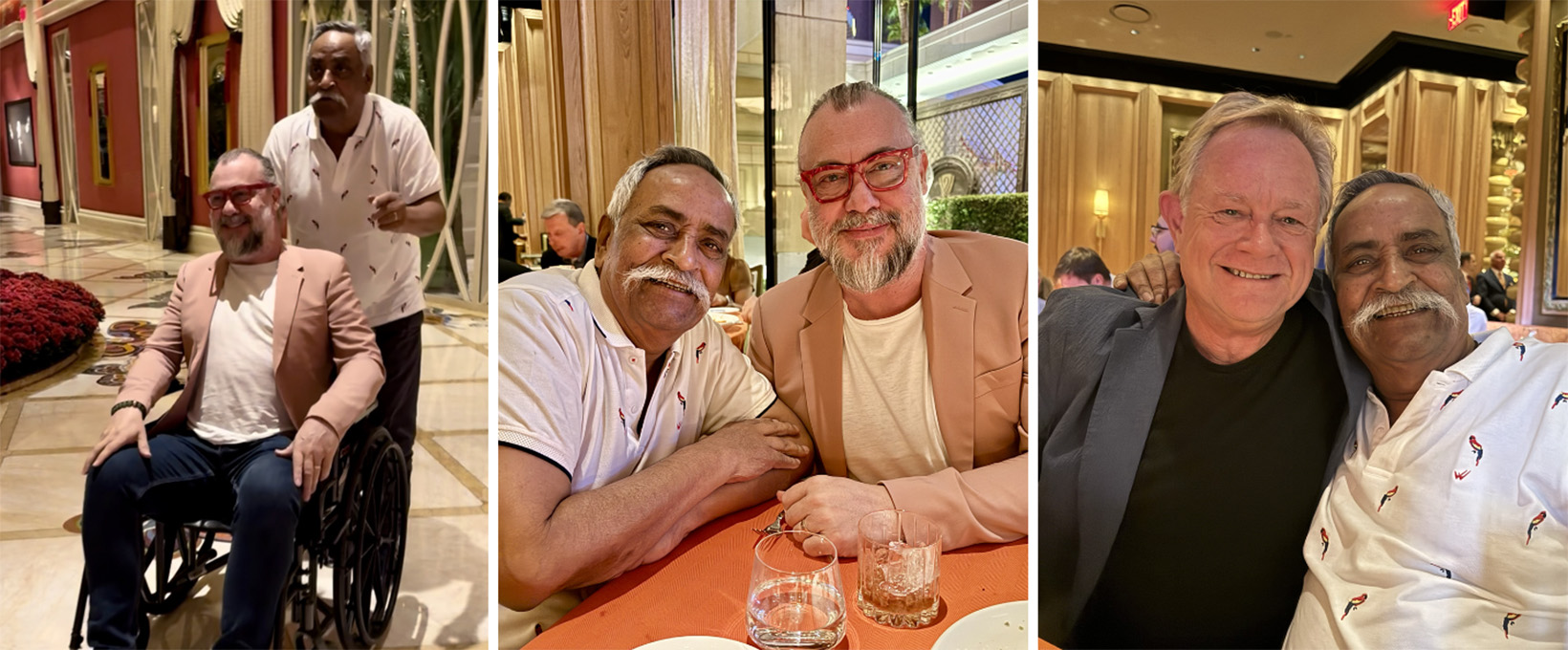
At the Kyoorius Awards in Mumbai his Master of Creativity Award presentation was was the highlight of the night – in front of a respectful industry gathering of 1500 including his family, close friends and his esteemed peers in the Indian Advertising industry (see below). His warm greeting that night was pure Piyush: “Welcome my friend. Thank you for coming to my small party.”
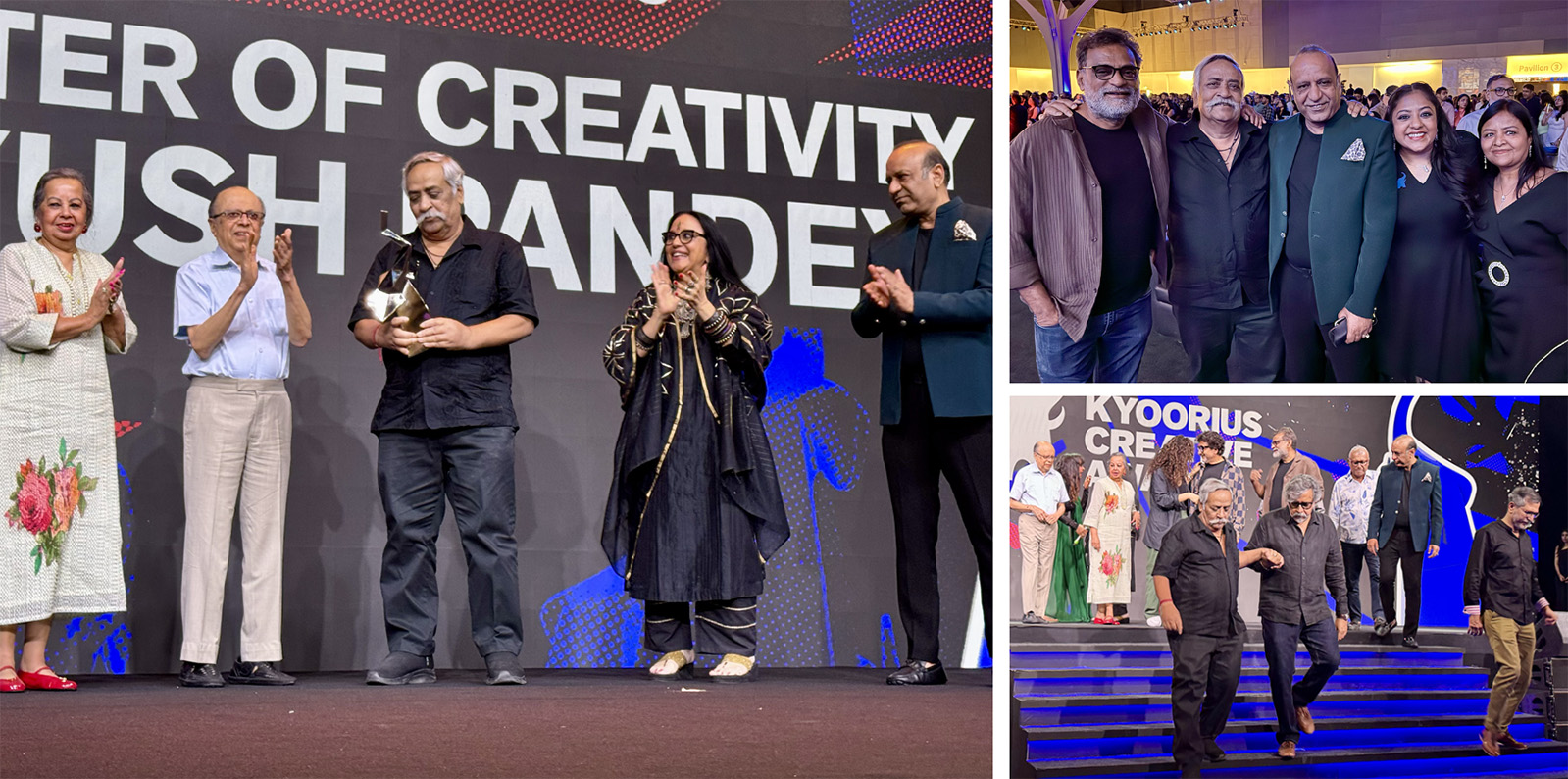
Piyush didn’t just create ads – he shaped the way India thinks and was a storyteller of a proud culture. He used humour and creative insights to give brands a voice that was unmistakably Indian.
Way back in 2004 Piyush’s great friend and protege, Sonal Dabral (another Indian legend) wrote this personal tribute for Campaign Brief Asia when we added Piyush Pandey to our Hall of Fame – joining the likes of Lionel Hunt, Jack Vaughan, Bhanu Inkawat, Yasmin Ahmed, David Droga and Bob Isherwood.
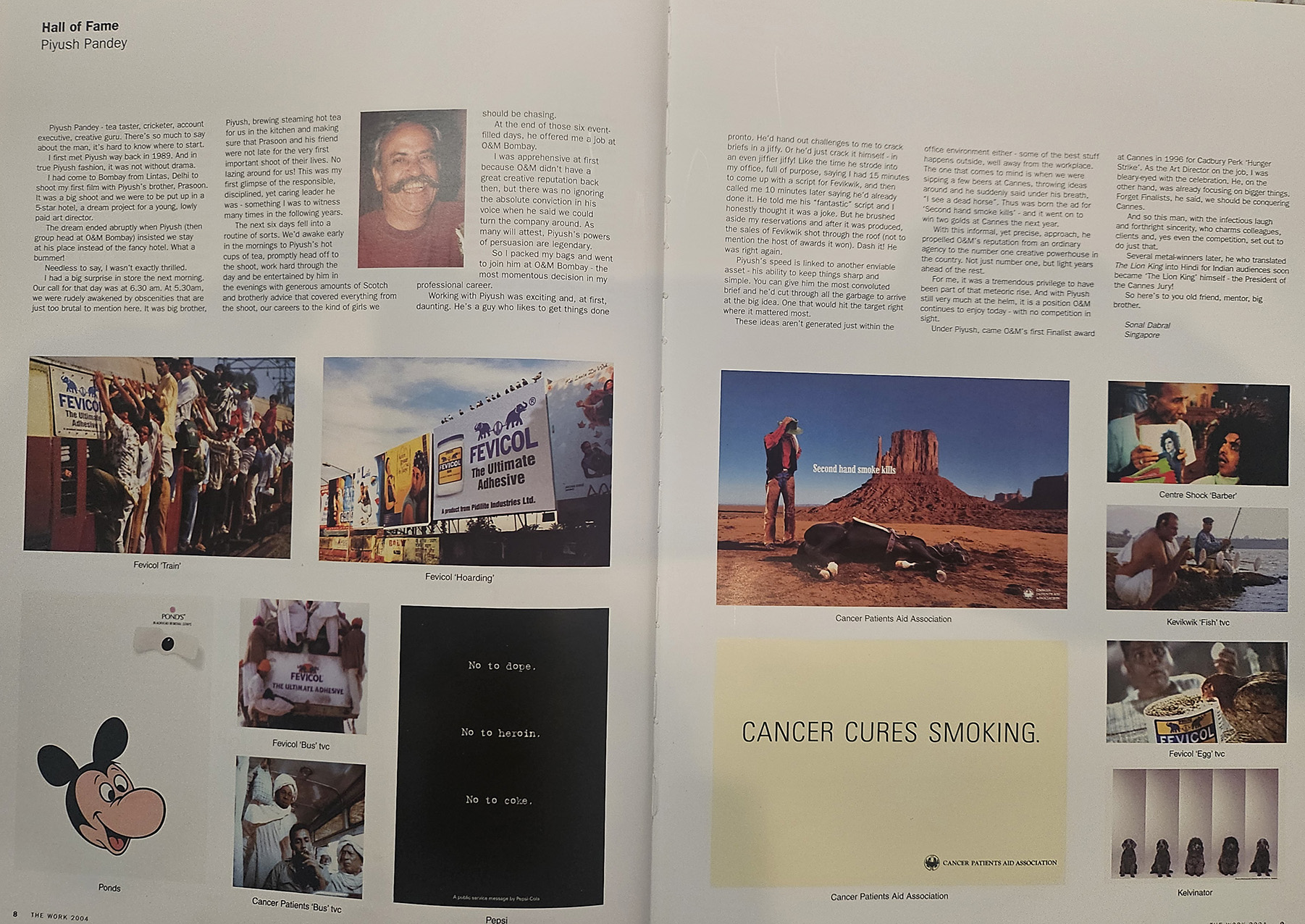
Piyush Pandey – tea taster, cricketer, account executive, creative guru. There’s so much to say about the man, it’s hard to know where to start.
I first met Piyush way back in 1989. And in true Piyush fashion, it was not without drama.
I had come to Bombay from Lintas, Delhi to shoot my first film with Piyush’s brother, Prasoon. It was a big shoot and we were to be put up in a 5-star hotel, a dream project for a young, lowly paid art director.
The dream ended abruptly when Piyush (then group head at O&M Bombay) insisted Prasoon and I stay at his place instead of the fancy hotel. What a bummer!
Needless to say, I wasn’t exactly thrilled.
I had a big surprise in store the next morning. Our call for that day was at 6.30am. At 5.30am, we were rudely awakened by obscenities that are just too brutal to mention here. It was big brother, Piyush, brewing steaming hot tea for us in the kitchen and making sure that Prasoon and his friend were not late for the very first important shoot of their lives. No lazing around for us! This was my first glimpse of the responsible, disciplined, yet caring leader he was – something I was to witness many times in the following years.
The next six days fell into a routine of sorts. We’d awake early in the mornings to Piyush’s hot cups of tea, promptly head off to the shoot, work hard through the day and be entertained by him in the evenings with generous amounts of Scotch and brotherly advice that covered everything from the shoot, our careers to the kind of girls we should be chasing.
At the end of those six event-filled days, he offered me a job at 08M Bombay.
I was apprehensive at first because O&M didn’t have a great creative reputation back then, but there was no ignoring the absolute conviction in his voice when he sald we could turn the company around. As many will attest, Piyush’s powers of persuasion are legendary.
So I packed my bags and went to join him at O&M Bombay – the most momentous decision in my
professional career.
Working with Piyush was exciting and, at first, daunting. He’s a guy who likes to get things done pronto. He’d hand out challenges to me to crack briefs in a jiffy. Or he’d just crack it himself – in an even jiffier jiffy! Like the time he strode into my office, full of purpose, saying I had 15 minutes to come up with a script for Fevikwik, and then called me 10 minutes later saying he’d already done it. He told me his “fantastic” script and I honestly thought it was a joke. But he brushed aside my reservations and after it was produced, the sales of Fevikwik shot through the roof (not to mention the host of awards it won). Dash it! He was right again.
Piyush’s speed is linked to another enviable asset – his ability to keep things sharp and simple. You can give him the most convoluted brief and he’d cut through all the garbage to arrive at the big idea. One that would hit the target right where it mattered most.
These ideas aren’t generated just within the office environment either – some of the best stuff happens outside, well away from the workplace.
The one that comes to mind is when we were sipping a few beers at Cannes, throwing ideas around and he suddenly said under his breath, “I see a dead horse”. Thus was born the ad for ‘Second Hand Smoke Kills’ – and it went on to win two golds at Cannes the next year.
With this informal, yet precise, approach, he propelled O&M’s reputation from an ordinary agency to the number one creative powerhouse in the country. Not just number one, but light years ahead of the rest.
For me, it was a tremendous privilege to have been part of that meteoric rise. And with Piyush still very much at the helm, it is a position 0&M continues to enjoy today – with no competition in sight.
Under Piyush, came 0&M’s first Finalist award at Cannes in 1996 for Cadbury Perk ‘Hunger Strike’. As the Art Director on the job, I was bleary-eyed with the celebration. He, on the other hand, was already focusing on bigger things. Forget Finalists, he said, we should be conquering Cannes.
And so this man, with the infectious laugh and forthright sincerity, who charms colleagues, clients and, yes even the competition, set out to do just that.
Several metal-winners later, he who translated The Lion King into Hindi for Indian audiences soon became ‘The Lion King’ himself – the President of the Cannes Jury!
So here’s to you old friend, mentor, big brother.
Sonal Dabral.
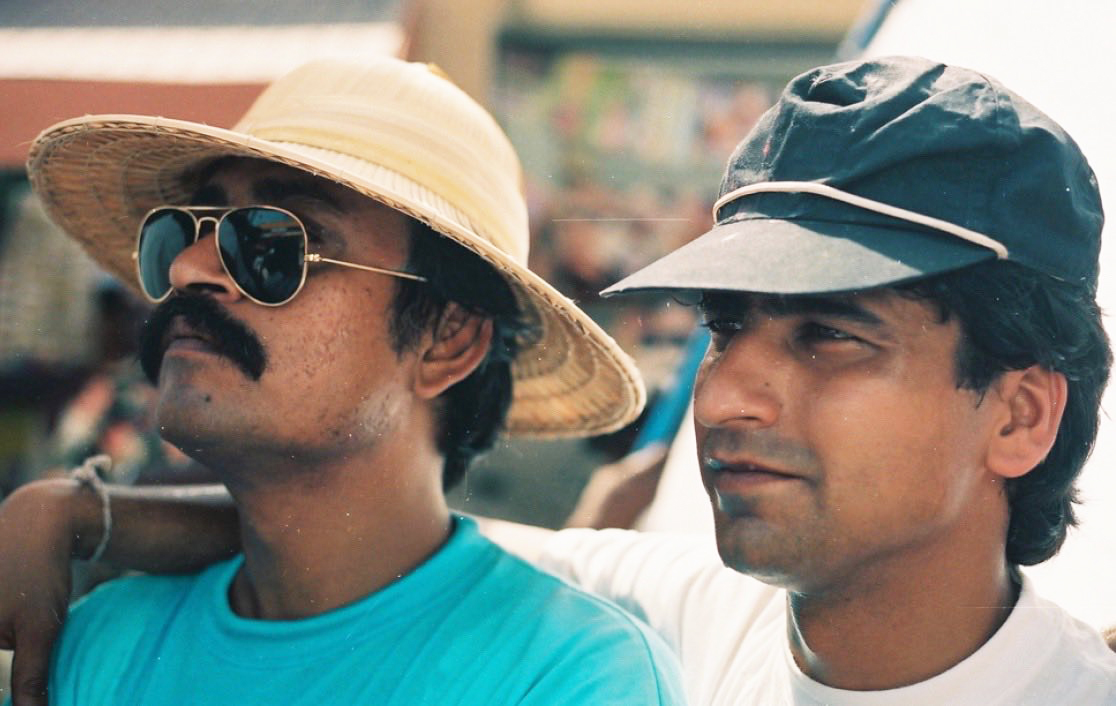
Piyush’s early work still stands the test of time (see below). Many demonstrate Pandey’s preferred approach – humour rooted in local culture. As Piyush is quoted: “Advertising is never to intimidate or frighten, but to delight.”
Rest in peace Piyush. You will always be remembered in the stories you told and the hearts you touched.
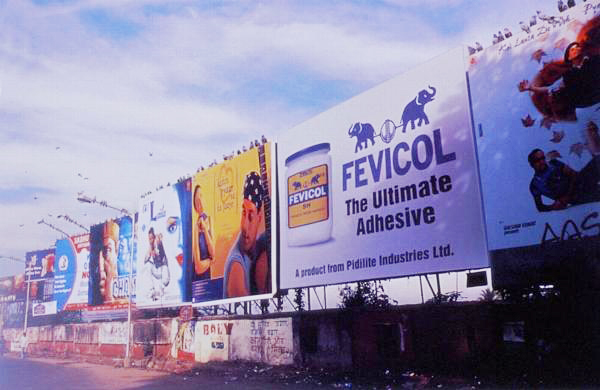
Fevicol Hoarding “Birds”
Fevikwik “Fish”
Cadbury Dairy Milk “Kuch Khaas Hai”
Polio Eradication Programme “Do Boond”
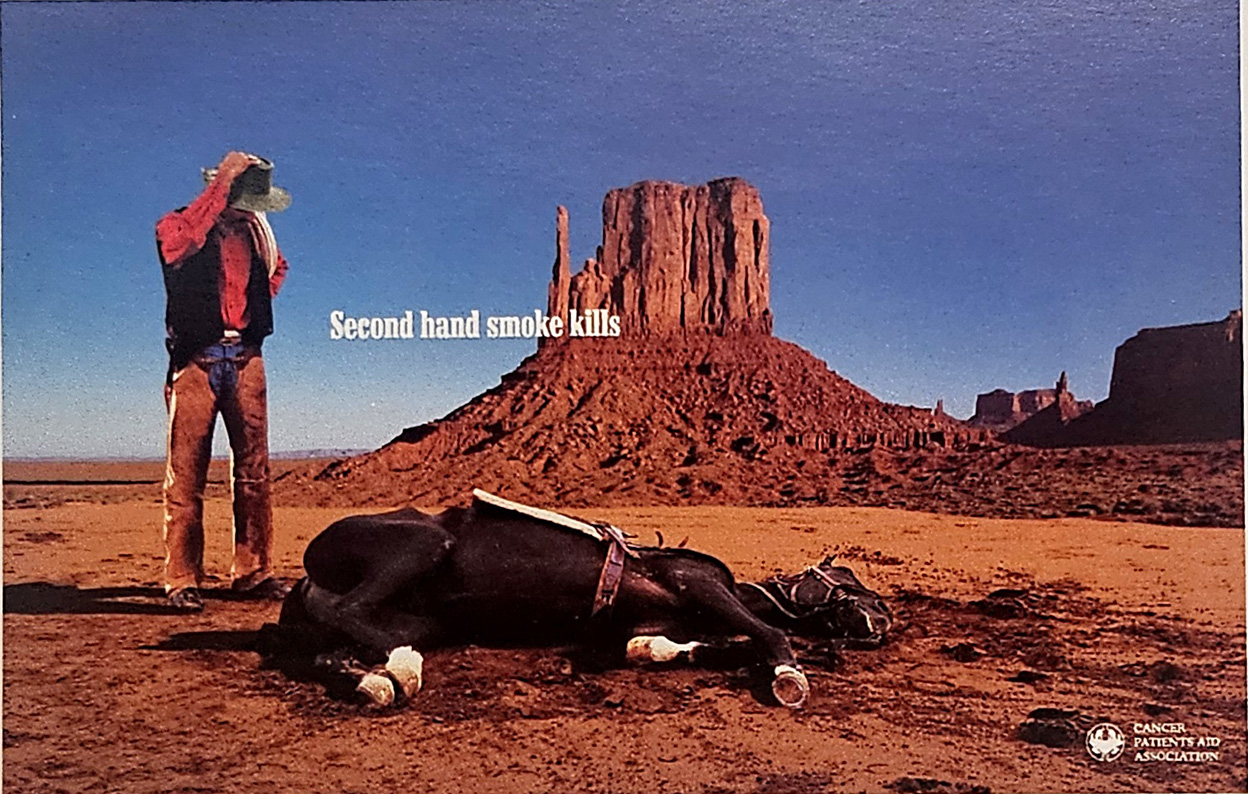
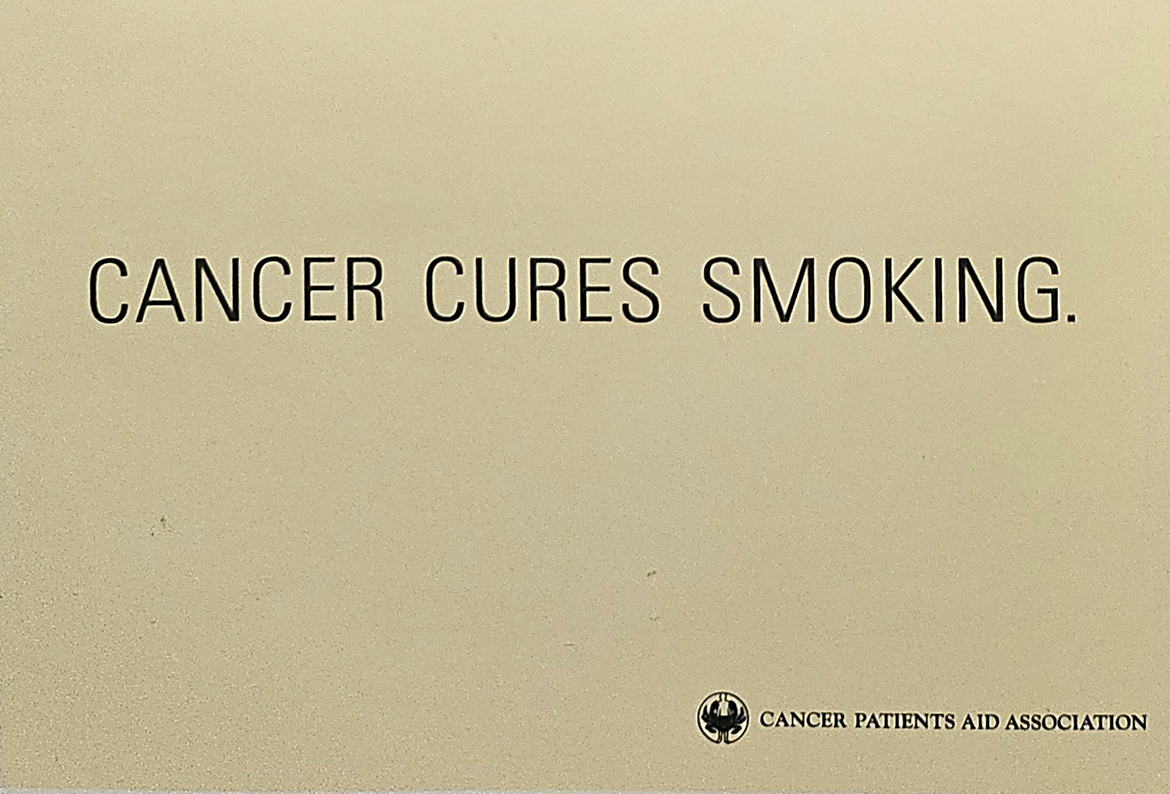
Cancer Patients Aid Association billboards.
Below are some Piyush memories from the Campaign Brief Asia camera – and that time when the legend starred in an advertising campaign for Campaign Brief Asia.
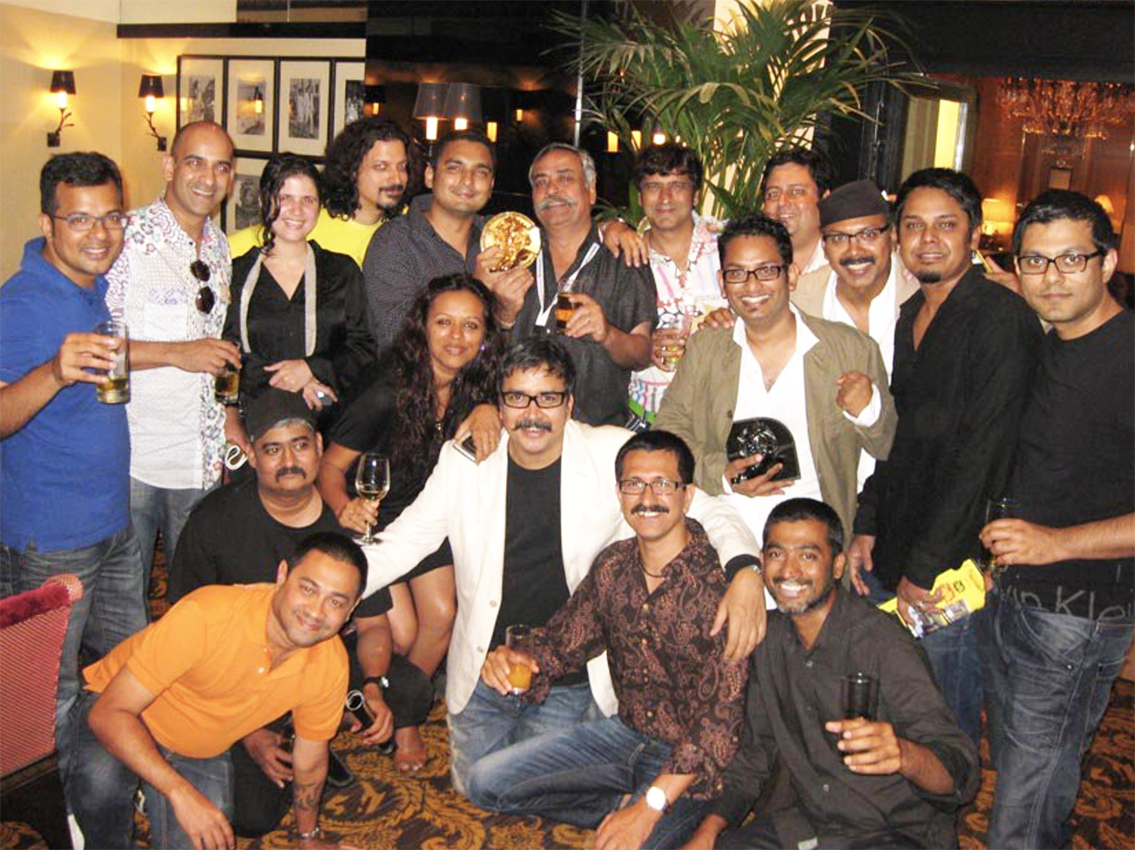
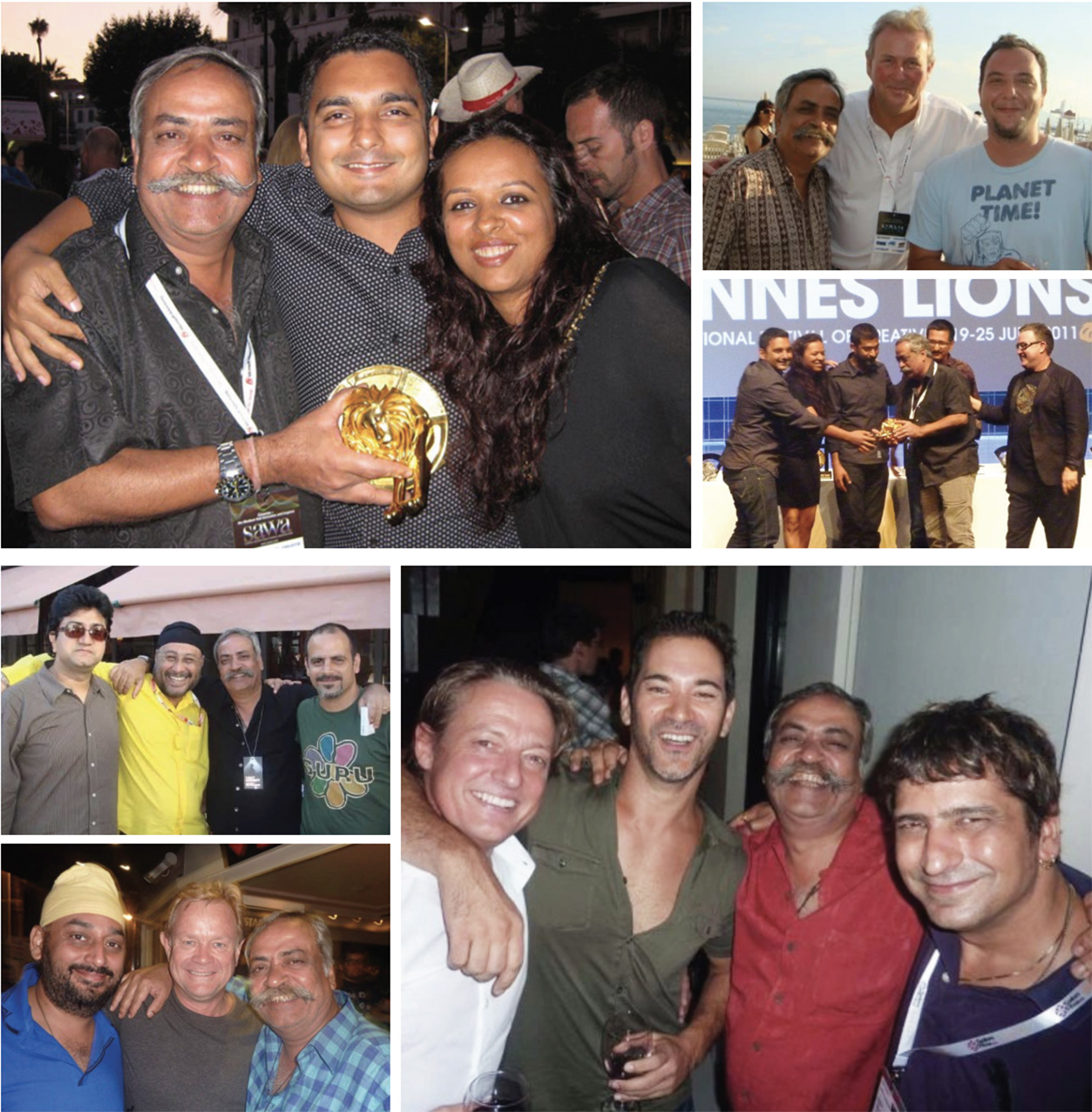
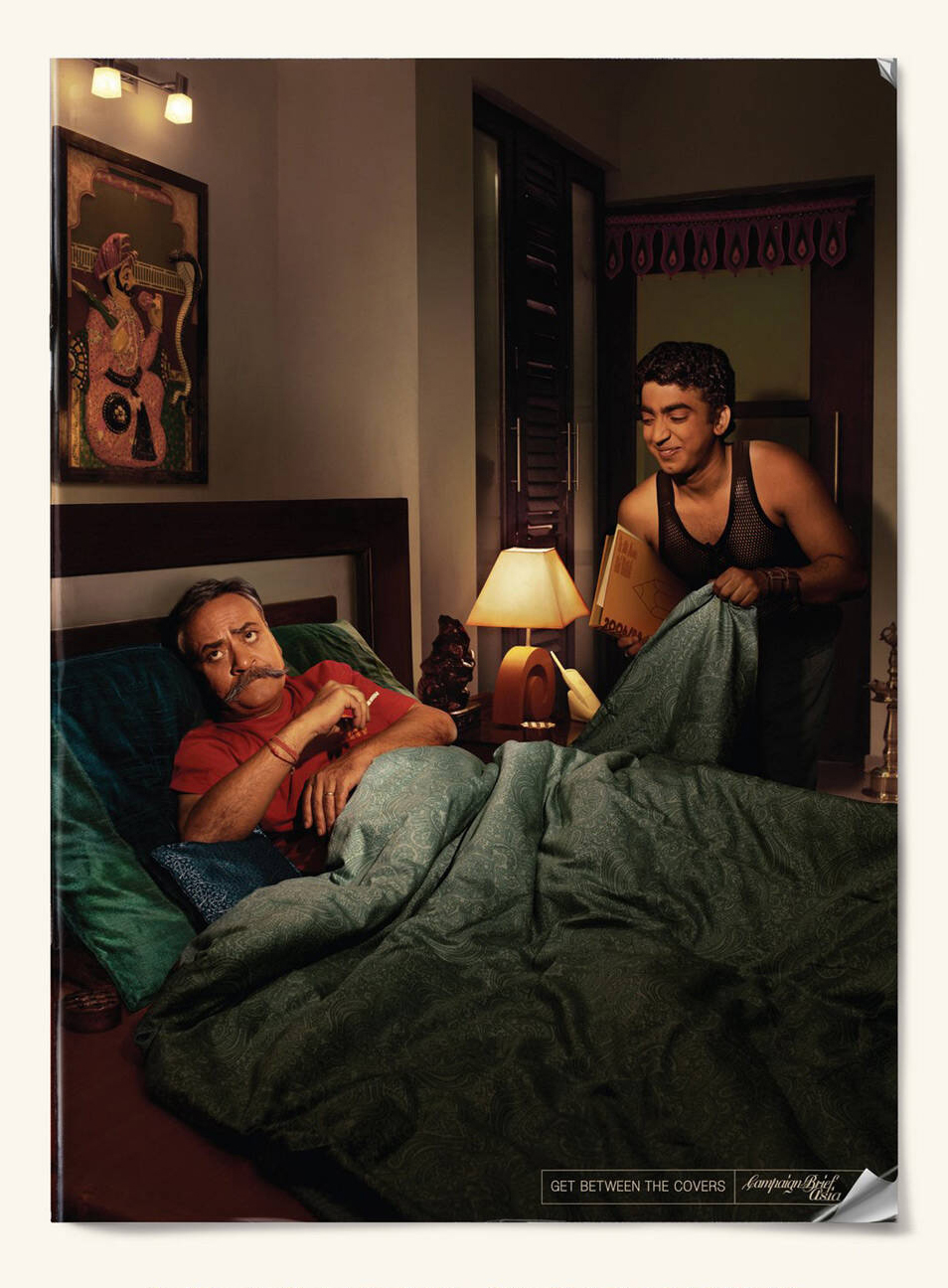

1 Comment
The front full page ad in the Times of India by Ogilvy placed as a tribute honouring Piyush said it both accurately and most eloquently; ”…trying to sum him up was like trying to capture the sun in a sewing box.”
RIP old friend.